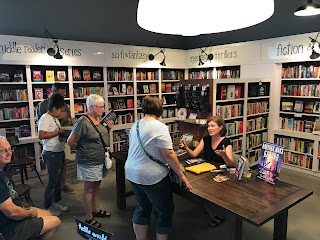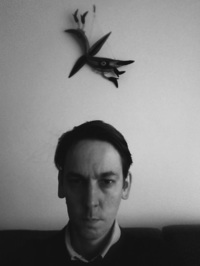I grew up knowing there were things girls couldn't do, because they were girls.
I really wanted to take karate. The parental veto quashed that. Karate, I was told, wasn't for girls.
It's forgivable. It was a different time, and changing people's perspectives wasn't quite as easy. Small town people like us could live small town lives, surrounded by neighbors with the same skin color and back then, you kept your nose out of other people's business. Nobody told anyone how to raise their child. You could see a crying kid dragged down the road, being told to just wait until they got home, and people wouldn't interfere. It was nothing to spank a child in public.
It was nothing to rape a wife. I suppose legally it likely wasn't even possible to be charged with such an offense.
For all our alleged progress, sometimes it seems little has changed. Oh, laws have impacted the way kids are disciplined, but it comes to gender issues, one doesn't have to go far to see that women are still treated as inferior; consider the fact that women are more likely to be killed by a partner than men are, and that 1/3 of murdered women in the U.S. are killed by a current or former partner.
Overt and subtle sexism exists within the world of entertainment as well. A few years ago, it was gamergate:
Gamergate started with a man lashing out at his game developer ex-girlfriend through a blog post crafted to incite the Internet against her. The maelstrom of subsequent accusations and threats sent Zoe Quinn into hiding. The furor soon sucked in anyone associated with her and those who sought to defend her. Targets were barraged with hatred via email and social media. Their employers were pressured to fire them. Sometimes their home addresses were publicly disseminated. Harassers made fake 911 calls to dispatch SWAT teams to their targets’ houses. (Link)
Over the weekend, an editor was attacked for posting a selfie.
As my own Facebook friends are aware, I had an issue last week with someone who had submitted a story to Spinetingler Magazine. Despite the fact that our submission guidelines are clearly posted, this person sent an incomplete submission.
Now, our system is set up to send an automatic reply, and that automatic reply reiterates how important it is that story submissions be complete. It actually states that incomplete submissions may be deleted without notification and that they will not be considered for publication.
I thought I'd be nice and take a minute and email the writer to let them know that unfortunately, we couldn't consider the submission as it was and it had to be deleted, and advised them to refer to our submission guidelines. I mean, all they had to do was complete the submission and resend it.
Instead, I received this:
I took the rare move of sharing it on Facebook because I have privacy settings in place, and because the name was so generic that it didn't paint a target on anyone's back. After being told to shove Spinetingler up my ass, I wrote back and informed the individual that further correspondence from them would not be read. They have also been informed that they are banned from submitting to the magazine.
The response?
I have not written back to this individual since; however, they have continued to email Spinetingler. When they did not receive a personal reply, they changed their email address and emailed again.
And again.
I haven't read them in full, although while filing all the documents in case of pursuing legal harassment charges, I did notice I'd been called shit-for-brains.
Such a way with words. I mean, I must seriously regret not fawning all over this individual the minute they graced our inbox with their so-called writing.
In this midst of this, some possible blame was thrown my way on Facebook by someone who seemed to think that the person's behavior could potentially be excused if I hadn't expressed myself clearly.
Why should anyone ever have to open email that is this abusive? This person initiated contact with us. This person even admitted that they knew the submission guidelines and ignored them.
But it's my fault they started swearing at me?
Others speculated that the reason this person was acting that way was because I'm a woman. When I go online and see a Marvel comics editor being harassed for being a woman, it's hard not to think that's a reasonable conclusion.
Lawmakers don't seem to treat this issue seriously.
When discussion of online harassment exploded into the mainstream a few years ago after Gamergate, I thought it would mean change was on the horizon. Today, I can see these years have been an utter waste. A federal bill to punish “swatting” sits in limbo. Reddit is still convulsed in the same battle with itself that it’s been fighting since 2014. A handful of bad actors are permanently banned from Twitter (though white nationalist Richard Spencer was un-banned this week). (Link)
Where does that leave us? Well, Spinetingler has always been a labor of love. The odd bit of money generated hasn't come close to covering costs of investment over the years.
And let's be real; nobody wants to pay for these things. We talk about artists being expected to give their work away for exposure, and I've experienced that as a writer as well. However, with Spinetingler, there are people reaching into their pockets and others banking off hours upon hours of time to keep things going.
We've watched ezines and magazines fold one by one, and from the glory days of online ezines promoting crime fiction, few of us are left.
We can celebrate being the first venue to publish a number of writers who've gone on to great success. James Oswald is one; Mindy Tarquini is another.
But the inference from someone that there was any justification at all for this person's continued harassment had me start thinking it was time to pull the plug after 12 years. I have my 9-5 responsibilities. I have a family. I have my own writing, and that's the main thing that gives out when I work on Spinetingler. While I'm certainly sad to see places shut down and don't want to pull the plug, there's an issue with how professional women are treated, and the backlash over a Marvel comics editor's selfie is proof of that.
If anyone's looking for a woman who may be occasionally seen but not heard, they've got the wrong woman here.
I don't want to believe that in 2017, women still need to have a platform extended to them because they're less than equal, but a lot of things lately have demonstrated that's the reality of the world we live in.
Do I ban books by male authors from being reviewed?
Do I prepare a female-only issue of Spinetingler?
This issue that I'm working on is a tester. If it can't generate ad or sales revenue to break even on the costs of paying writers and artists involved (no pay to editors, no contribution to website costs) then it may be the last we ever do. We've been toying with an option to put it into print, but I'm reluctant to do that because I'm not sure we'll be continuing next year.
Working as an editor has schooled me as a writer in ways I never could have imagined when I started out. What I learned that every writer should know before they submit material anywhere:
1. ALWAYS follow the submission guidelines.
2. You are not the exception to the rules.
3. Editors are very busy. Don't email them every few weeks to check on the status of your submission. (I have writing I submitted to publishers six months ago that I still haven't followed up on.)
4. Professionalism and courtesy will go a long, long way in the publishing business.
5. Editors will reject stories because a writer is difficult to work with.
6. Writers unwilling to make corrections to their work or consider developmental editing suggestions earn a reputation of being difficult to work with. (See #5.)
7. The publishing world is small. Chances are, if you've make a horrible impression on one editor, they've told at least three others.
I referenced this writer being banned. Spinetingler has a shitlist. I'd bet cold, hard cash that other publications do as well.
Editors don't put rules and guidelines in place because they're anal or because they enjoy tormenting writers. They do it to ensure that writers have the best chance of success with their submission. I learned years ago to include strict formatting guidelines because I accepted a story that wasn't properly formatted. The writer had used a hard return at the end of each line like a typewriter, and that meant that all of those hard returns had to be extracted... Only they refused to do it.
I gave up hours of my time to do it, and in the end, after talking to some other editors, I realized I had made a mistake by coddling this writer and wasting my own time. Any writer who won't correct their material will be unaccepted.
I hold firm on that to this day. Occasionally, I still get to read a story that blows me away and I instantly love it, but within what we accept there are a number of stories that went through a period of time where they were simply under consideration. They may have been similar to another story in terms of theme. There may be technical writing issues that need to be corrected. Error-free and original stories will always rise to the top, but many stories simply just edge another story that's comparable out because we have to make decisions.
That's taught me that for every piece of writing I send out, there are a hundred others who've submitted and are fighting for the same slot. The odds are against even those of us who've been traditionally published. Nothing is guaranteed to anyone in this industry.
Whether you're a man or a woman, you have to work for what you get.
And if you really are a sexist asshole, you'd best keep that on lockdown while dealing with professionals in the industry.











































